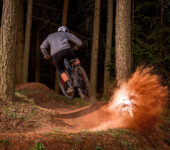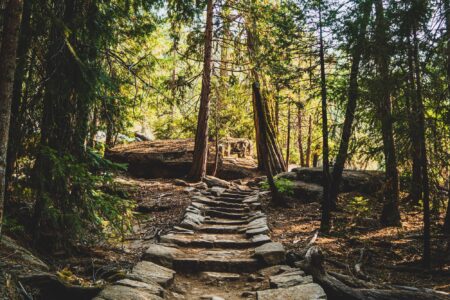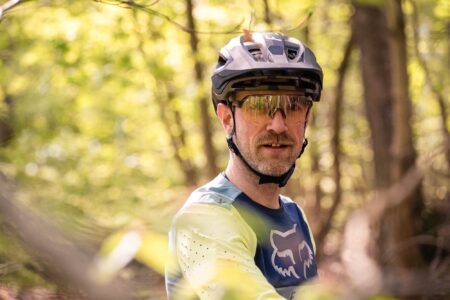Peloton For Mountain Biking Series #1 – My Peloton Experience
- Matthew Chisholm
- February 21, 2022
- Lifestyle

Photo by Andrew Valdivia
I cannot think of a topic more controversial in the world of competitive cycling than that of the Peloton. The debates about the luxury electronic fitness platform that delivers premium levels of cycling content were magnified during Covid. Peloton has been under such intense technical and financial scrutiny that it seems they only exist under the microscope, an organization prodded and laughed at its own expense. Can using a Peloton for mountain biking be a valuable tool despite its financial cost and cultural drawbacks?
My initial experience
I have owned a Peloton now for almost three years. I originally bought it for my wife after our twins were born, and we found ourselves unable to find the time to drive to the gym or exercise outside due to the weather. I was excited, she was excited, and we quickly got into the rhythm of going down to our basement to grab one of the literally thousands of classes available on demand.
I was initially impressed! The Peloton is more than good-looking dance instructors on bikes. Sure, plenty of classes are geared to the music, holding high cadences, or even dancing on the bike. I wasn’t that interested in those aspects of the Peloton, but I still had plenty of access to content that I thought could benefit me immediately.
The real game-changer was that the Peloton bikes had a power meter built-in. I had trained a little with wattage as my primary metric, but I had never owned a power meter before. First, I couldn’t afford it. Second, I didn’t want to care about yet another number in addition to speed, miles, heart rate, cadence, etc., while riding. I love to ride by feel most days, but that doesn’t help with training in the long run. The power meter on the Peloton allowed me to separate training by feeling to training by a gold-standard metric. I could control how many times I engaged with knowing my power output, and then if I wanted to ride outside and forget about it, I could. One of the best aspects of the Peloton brand is the avalanche of content available at all points every day. I quickly found that actual power instructors with racing backgrounds taught several series of power classes that stretched back years. I had found my niche on the Peloton and didn’t look back.
Three years in the making
Now, three years later, I can measure my activity on the Peloton and see how it has shaped my riding outside, specifically on the mountain bike. Of course, riding on any trainer is more about fitness than bike-handling (unless you’re on the rollers, which I still can’t do), so the Peloton is only going to impact your fitness. Also, if you are like most people, riding on a trainer longer than an hour is nearly impossible, so the effects of the indoor training are limited in terms of time you spend in the saddle relative to riding outside. So what is the benefit, and does it outweigh the cost?
The truth is that I have drastically benefitted from my Peloton in terms of fitness and energy to stay on the bike. Even though I lived in the southeast, I found myself no longer willing or able to ride outside for large portions of the winter. The Peloton gives me an exciting opportunity for training in a highly engaged and varied setting. Sometimes I even pretend in my mind that choosing different classes and trainers is like riding other trails. Sure this seems like a stretch, but I’ve been able to trick my mind into finding stimulus in the diversity of training regimens which mirrors the variety I will later see in the woods.
There is no suitable replacement for riding outside on the trails if you’re a mountain biker. But getting out isn’t always possible due to weather and time constraints. This series will dive a bit more into the hidden details of the Peloton experience. I urge you to consider how an indoor trainer can increase your fitness and possibly the Peloton. Especially during these winter months.
Matthew Chisholm
Matt Chisholm is a data analyst and freelance writer who studies the environmental history of the Southern Smoky Mountain region of North Carolina. He was a contributor to Lost in Transition: Removing, Resettling, and Renewing Appalachia and the 2016 edition of the Journal of East Tennessee History, for which he won the 2017 McClung Award. When not writing, Matt enjoys road and mountain biking, hiking, trail running, and drinking beer around Concord, NC where he lives with his wife, daughter, and twin boys.
Get the email for busy mountain bikers.
Discover the best products + gear, and learn about deals from brands you love.






